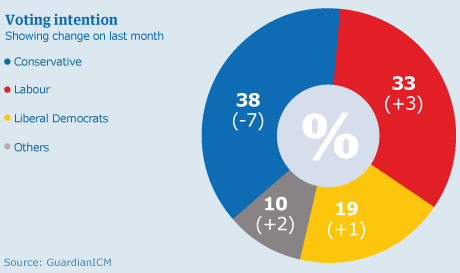NPR’s Rob Gifford asks, “Is Britain’s Labour Party Back To Pre-Blair Ways?”
After Tony Blair was elected British Prime Minister in 1997, he blurred the line between the Labour Party and the usual opponent, the Conservative Party. But the global financial crisis has forced Prime Minister Gordon Brown to take the Labour Party back to a platform of nationalized banks, government assistance for industry and massive public borrowing.
Critics say the Labour Party’s Socialist roots are showing.
American readers will recognize these Old Labour policies as pretty much what the “conservative” administration of George W. Bush is doing in the United States. For that matter, it’s what the center-right Nicolas Sarkozy and Angela Merkel are doing in France and Germany, too. So, perhaps, rather than a return to ideological basics, this is simply the only choice governing parties feel they have in the face of what most are terming the worst economic downturn since the Great Depression.
The Tories, in opposition, have had the luxury of sticking to their intellectual guns and opposing some of the more extreme measures. A new Guardian poll, however, shows that they are being punished for that stance.
Labour has cut sharply into the Conservatives’ lead as voters turn to the government to protect them from the economic storm, according to a new Guardian/ICM poll. It shows a seven-point drop in Tory support since last month, narrowing the gap between the two main parties from 15 points to just five. Today’s poll is in line with other recent surveys, making it clear that the opposition has crashed back to reality after a triumphant summer, and David Cameron is not seen as the man to revive the economy. The results will inevitably fuel talk of an early election next February or in the spring, although Labour is still well short of the sort of support needed to retain its majority.
[…]
The five-point Tory lead is still substantial – wider than the gap between the two big parties in the 2005 election. But the race has not been so close since spring.
The fall pushes the Conservative party below the symbolic 40% mark – above which the party is all but assured of winning the largest number of seats in the Commons.
[…]
In particular, voters are sceptical of the opposition’s ability to handle the economy. Asked to compare Cameron and Gordon Brown on a series of characteristics, Brown pulls ahead by 11 points as the person most likely to get the economy back on track. He scores 35% against 24% for Cameron.
My own instincts are that the universal instinct among governments in the West to Do Something in what is likely a futile effort to stave off a worsening of the crisis is reactionary and short-sighted. But, rather clearly, the pressure on them to act is enormous. And public opinion across the West is generally in favor of very aggressive action.
James Joyner is managing editor of the Atlantic Council.
